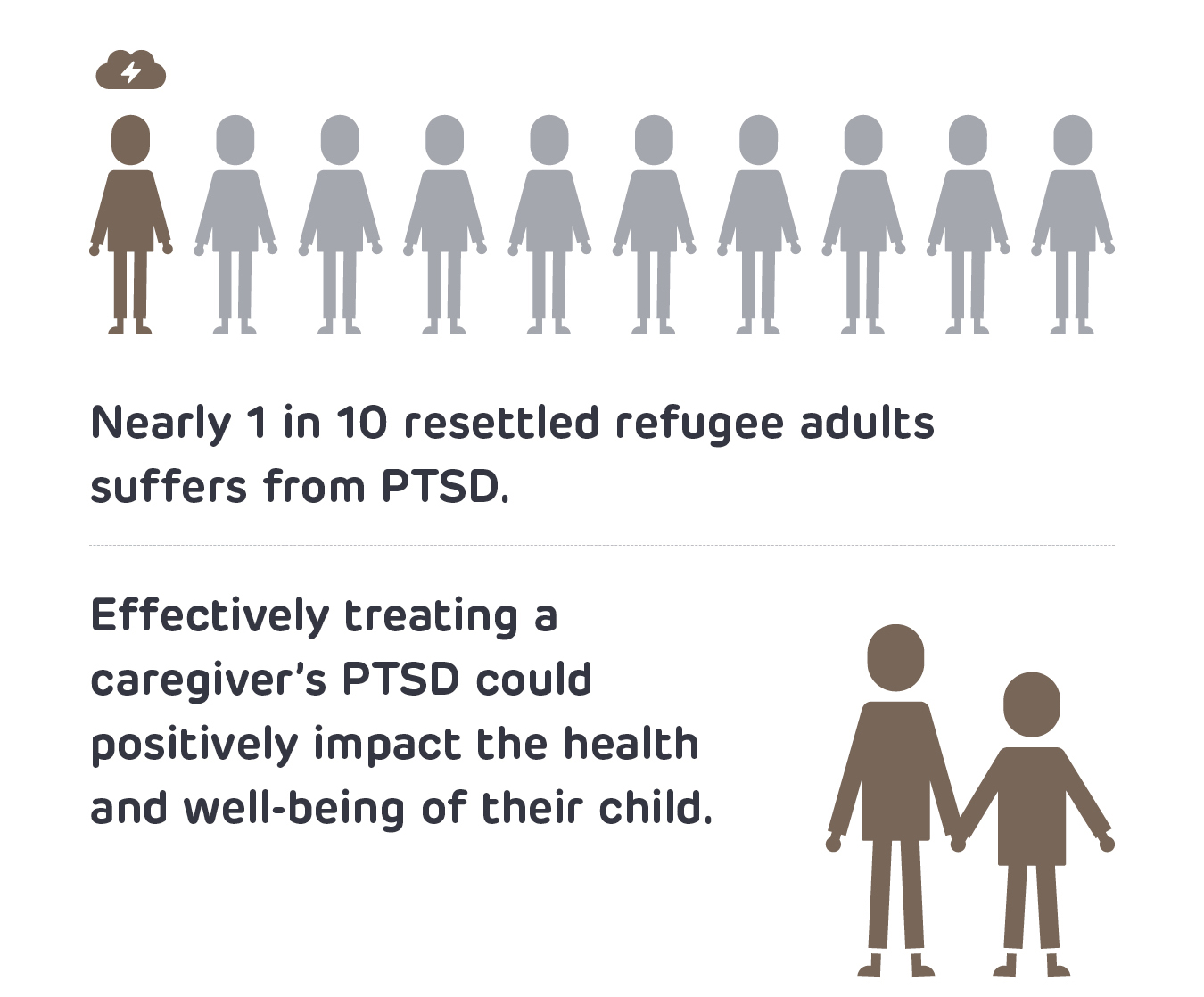Helping Refugees with PTSD Receive the Care They Need
Statement of Problem
Post-traumatic stress disorder (PTSD) affects nearly 1 in 10 resettled refugee adults in high- and middle-income nations. Not effectively treating an adult’s PTSD can have profound negative impacts on their child’s behavior and development, which can lead to a number of health-related issues in the future. We know that kids do better when their parents do better, so it’s essential to take the necessary steps to improve the health of caregivers.
The Patient-Centered Outcomes Research Institute (PCORI) has a comprehensive systematic review that outlines the evidence base for PTSD treatment titled “Psychological and Pharmacological Treatments for Adults with Posttraumatic Stress Disorder.” However, the review does not describe the evidence specifically for refugees and does not include direction to clinicians on how to present treatment options to adults with emerging English proficiency.
Description
Helping Refugees with PTSD Receive the Care They Need
Helping Refugees with PTSD Receive the Care They Need


This project will focus on increasing knowledge of Patient-Centered Outcomes Research Institute treatment evidence among clinicians who care for refugees, as well as professional interpreters and refugee community leaders, and provide guidance on how to discuss treatment options with patients.
This project focused on increasing knowledge of Patient-Centered Outcomes Research Institute treatment evidence among clinicians who care for refugees, as well as professional interpreters and refugee community leaders, and provides guidance on how to discuss treatment options with patients.
In partnership with Pennsylvania’s Refugee Resettlement Program, Children’s Hospital of Philadelphia’s Refugee Health Program and Multi-Cultural Health Evaluation Delivery System, Inc., we focused on increasing knowledge of PCORI’s treatment evidence among clinicians who care for refugees, as well as professional interpreters and refugee community leaders, and providing guidance on how to discuss treatment options with patients. As a first step, we developed a brief, provider-oriented summary of PCORI evidence on PTSD treatment for adult refugees. Next, we created a multi-lingual glossary for accurately and sensitively discussing PTSD treatment recommendations with refugees from a variety of backgrounds, which contains a list of PTSD-related terms and phrases. You can find these glossaries here:
With support from PolicyLab’s communications team and Pennsylvania’s Refugee Health Program, we disseminated these materials to clinicians, professional interpreters and refugee leaders through multiple platforms like social media, listservs, websites, webinars and presentations in order to increase awareness of the research. We then surveyed clinicians and other stakeholders to measure changes in their awareness of PTSD treatment recommendations.
In September 2020, our team hosted "Talking About PTSD: Improving Communication and Care for Refugee Patients," a webinar during which we discussed the challenges of communicating mental health treatment options across language and cultural differences and how these new resources can help foster better communication between clinicians, professional medical interpreters and refugee patients. You can find a recording of this webinar here.
In response to the COVID-19 pandemic, our team also shared resources and strategies for community leaders who are assisting refugee community members experiencing increased stress or trauma during the pandemic through a series of webinars. These webinars were recorded in Arabic, Burmese, English (ASL), Nepali and Swahili. Through these recorded virtual events, we hope to increase provider and community awareness of resources available to help immigrant families cope with stress.
Next Steps
Our hope is that by strengthening providers’ knowledge of PTSD treatment for refugees, all refugees will have the opportunity to live a healthy life not only for themselves, but also for their children.
PCORI is an independent, non-profit organization authorized by Congress in 2010 to fund comparative effectiveness research that will provide patients, their caregivers, and clinicians with the evidence needed to make better-informed health and healthcare decisions. PCORI is committed to seeking input from a broad range of stakeholders to guide its work.
This project page was last updated in December 2021.
Suggested Citation
Children's Hospital of Philadelphia, PolicyLab. Helping Refugees with PTSD Receive the Care They Need [Online]. Available at: http://www.policylab.chop.edu [Accessed: plug in date accessed here].